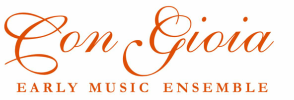Stephen Schultz, called “among the most flawless artists on the Baroque flute" by the San Jose Mercury News and “flute extraordinaire” by the New Jersey Star-Ledger, plays solo and Principal flute with the Philharmonia Baroque Orchestra and Musica Angelica and performs with other leading Early music groups such as Tafelmusik Baroque Orchestra, Apollo's Fire, Con Gioia, Portland Baroque Orchestra, Wiener Akademie, Chatham Baroque and at the Oregon and Carmel Bach Festivals. Concert tours have taken him throughout Europe and North and South America with featured appearances at the Musikverein in Vienna, Walt Disney Concert Hall in Los Angeles, Royal Albert Hall in London, Concertgebouw in Amsterdam, Teatro Colón in Buenos Aires, Carnegie Hall, and the Library of Congress. He has performed frequently with Con Gioia since the ensemble’s inaugural concert in 1982.
A graduate of the Royal Conservatory of Music in Holland, Schultz also holds several degrees from the California Institute of the Arts and the California State University of San Francisco. Currently he is Teaching Professor in Music History and Flute at Carnegie Mellon University and director of the Carnegie Mellon Baroque Orchestra. Mr. Schultz has also been a featured faculty member of the Jeanne Baxtresser International Flute Master Class at Carnegie Mellon University and has taught at the Juilliard School and the International Baroque Institute at Longy School of Music. In 1986, Mr. Schultz founded the period instrument ensemble American Baroque. This unique group brings together some of America's most accomplished baroque instrumentalists, with the purpose of defining a new, modern genre for historical instruments. As solo, chamber, and orchestral player, Schultz appears on over fifty recordings for such labels as Dorian, Naxos, Harmonia Mundi USA, Centaur, NCA, and New Albion. Schultz has also performed and recorded with world music groups such as D’CuCKOO and Haunted By Waters, using his electronically processed Baroque flute to develop alternative sounds that are unique to his instrument. He has commissioned new music written for his instrument and in 1998 Carolyn Yarnell wrote 10/18 for solo, processed Baroque Flute and dedicated it to Mr. Schultz. The Pittsburgh composer Nancy Galbraith wrote Traverso Mistico, which is scored for electric Baroque flute, solo cello, and chamber orchestra. It was given its world premiere at Carnegie Mellon University in April 2006 and this highly successful collaboration was followed in 2008 with Galbraith's Night Train, Other Sun in 2009, Effervescent Air in 2012, and Dancing Through Time in 2013.
A graduate of the Royal Conservatory of Music in Holland, Schultz also holds several degrees from the California Institute of the Arts and the California State University of San Francisco. Currently he is Teaching Professor in Music History and Flute at Carnegie Mellon University and director of the Carnegie Mellon Baroque Orchestra. Mr. Schultz has also been a featured faculty member of the Jeanne Baxtresser International Flute Master Class at Carnegie Mellon University and has taught at the Juilliard School and the International Baroque Institute at Longy School of Music. In 1986, Mr. Schultz founded the period instrument ensemble American Baroque. This unique group brings together some of America's most accomplished baroque instrumentalists, with the purpose of defining a new, modern genre for historical instruments. As solo, chamber, and orchestral player, Schultz appears on over fifty recordings for such labels as Dorian, Naxos, Harmonia Mundi USA, Centaur, NCA, and New Albion. Schultz has also performed and recorded with world music groups such as D’CuCKOO and Haunted By Waters, using his electronically processed Baroque flute to develop alternative sounds that are unique to his instrument. He has commissioned new music written for his instrument and in 1998 Carolyn Yarnell wrote 10/18 for solo, processed Baroque Flute and dedicated it to Mr. Schultz. The Pittsburgh composer Nancy Galbraith wrote Traverso Mistico, which is scored for electric Baroque flute, solo cello, and chamber orchestra. It was given its world premiere at Carnegie Mellon University in April 2006 and this highly successful collaboration was followed in 2008 with Galbraith's Night Train, Other Sun in 2009, Effervescent Air in 2012, and Dancing Through Time in 2013.
